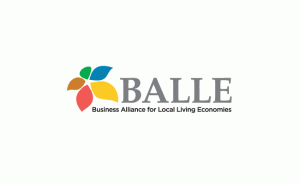 OK, following up on what I shared a couple of days ago, here are the rest of the notes I hastily scratched during the BALLE workshop on newly evolving alternative methods for funding businesses. Hopefully it’s of use to those of you in the audience who are thinking about such things.
OK, following up on what I shared a couple of days ago, here are the rest of the notes I hastily scratched during the BALLE workshop on newly evolving alternative methods for funding businesses. Hopefully it’s of use to those of you in the audience who are thinking about such things.
Here’s what the speakers had to say about their various capitalization models…
PANEL 3
Cooperatives and Worker-Owned Businesses:
Lynn Benander (Co-op Power):
Co-op Power does work in Massachusetts and Vermont. They’re consumer-owned. People join and invest. Their structure involves 20-person councils, each of which has a voice on the company’s board. Anyone can invest, and create a council. The co-op’s objective, according to Benander, is to help their region kick the fossil fuel habit, increase renewables, create jobs, etc. They’re all about providing innovative job training, helping people to invest in the communities in which they live, regaining community control over resources, breaking down class and race barriers, etc. The councils decide where in their communities that they would like to invest. And, their investors make money in the form of dividends. I may be off on the numbers, but I believe she said that anyone can join for $1,000, and that they currently have 440 members. They’ve launched 10 companies, investing over $300,000 in member equity. In addition, they’ve provided companies with $820,000 in low-interest loans. And, in the process, they’ve created 100 jobs. They have multiple solar projects, and are preparing to bring a biodiesel plant online. (The biodiesel plant project first began in 2002, with a grant from the National Renewable Energy Lab. A Venture Capital (VC) firms, soon afterward, inquired about investing. Not wanting to lose control, they said no. The VC went on to invest in a plant in Delaware, which they promptly scrapped and sold off for parts. This, according to Benander, illustrates why it’s so important to maintain local control.) Now, she says, they have a voice in state government.
Community Supported Enterprise:
Erin Kilmer Neel (Awaken Café):
Awaken Café is in Oakland, California, and Neel is one of the café’s investors, owning less than %1 of the business. She shows a photo of George Bush, saying that, “this is the reason Awaken Café was opened in 2004.” The guy who had the idea to open the business, disillusioned by national politics, decided that he’d rather focus on making change at the local level. He wanted a place to, “bring people together, and launch movements.” He engaged his community, holding town hall meetings before opening, and asking the people in the community for their input. He held fundraising events, raised private money from friends and family, and maxed out his credit cards. A total of 8 friends and family members invested $300,000 in a private placement. The cost of legal counsel and filing fees came to $8,000. Needing more capital to get launched, he then began pre-selling “creator cards.” People would purchase them in amounts ranging from $100 to $1,000. (The more the amount, the greater the discount a person would receive. A $1,000 card, for instance, would allow one to purchase $1,250 worth of goods, once the business opened. Even with this discount, according to Neel, the business would still make money.) He sold $14,000 in cards (mostly to friends and family). They received a Small Business Administration loan for $20,000. (Unfortunately, issues with their landlord forced them to move, but they didn’t give up. They relaunched.) They waged three Indiegogo campaigns in 2010. The first raised $3,500. (Most people gave between $25 and 30$.) The owner of the business, according to Neel, posted an average of 30 things to various social media platforms per day, during the second campaign. This resulted in over $10,000. Neel noted that, during this campaign, almost every other business owner on the street contributed. (I have a note that they raised $400,000 from 18 people, but I don’t know if that’s just during this period, or if that’s over the entire time that they were fundraising.) They also got redevelopment grants, grants for their green construction work, etc. The bottom line, according to Neel, is that relationships are what made it happen… And, now, the place is always packed, and it serves as the quasi community center that it was envisioned to be. What’s more, it’s helping to revitalize the area.
Community Partnership Lending:
Leslie Ackerman (Alternatives Federal Credit Union):
Their work primarily has been to offer low-interest loans to people who need down-payments for apartments, and the like. They essentially serve as a resource for people in Ithaca, New York who are struggling, and in need of temporary assistance, so that they can keep a job, stay in an apartment, etc, and not fall into the welfare system. They have been branching out, though. They’ve created a mechanism, in partnership with Slow Money of Central New York, though which local people can invest in local businesses. They raise money from the community, and use it to offer below-market-rate loans for businesses that need temporary assistance. The bank just looks to cover their overhead, she tells us. The rate is generally 6%. She said that, if people contributing toward the fund wanted a return, they could add another percent or two on top of that. She mentions also that, with grants and the like, it might be possible to cover some of the bank’s overhead, so that the rate could drop below 6%. Or, she adds, maybe there could be a loan application fee, which would cover the bank’s costs. She says that BALLE chapters across the U.S. could do the same thing, partnering with their local credit unions. It’s brought up that every group would have to determine their own policies… Would you require a business plan? Would you require audited financials? Would everyone’s money be pooled, and invested in a number of different businesses, or would people have the opportunity to choose which companies they were investing in?
Direct Public Offerings:
Marty Gay (Quimper Mercantile Company):
They raised the money from friends and neighbors to open a mercantile company, when their small town’s department store went out of business. There town, Port Townsend, is a two-hour ferry trip from Seattle, and has only 10,000 inhabitants. When the town’s department store (Swain’s General Store) closed, according to Gay, people no longer had a place to buy socks and underwear, without driving an hour, or resorting to the internet. (The community didn’t want to lure a chain store either. They’d fought off a Rite Aid a few years earlier.) So, they solicited equity investments from their friends and neighbors. (Washington State law allows for unaccredited investors to invest up to $50,000 each.) Following in the footsteps of Powell, Wyoming, which had done something similar a few years before, Gay and some friends filed a Small Company Offering Registration (SCOR), and began seeking equity investors. (The people who invested in the Powell general store, he tells us, have actually made money, as the store, after a bit of a slow start, has begun to turn a profit.) It’s not a co-op, he tells us, but there’s local control. This undertaking, he tells us, grew out of Port Townsend’s Local Investing Opportunities Network (LION) group, which facilitates relationships between local investors and those seeking startup money, or capital to grow their existing businesses. Organizing under the SCOR designation allowed them to sell equity to unaccredited investors, but there were strings attached. They couldn’t advertise. They couldn’t take money from investors from out-of-state. And they couldn’t raise more than $1 million. So, they started presenting at local farmers markets, and doing road shows, where they’d pitch to potential investors. In the end, they raised their $1 million. People from all around the country (which has a population of 30,000) wanted to be a part of it. People would invest, he said, “just to get a button,” which identified them as an investor. He estimates that it cost them about $6,500 to raise the money… The store will open this fall… “The terrible thing that happened (with the crash of 2008),” said Gay, “turned out to be the greatest thing that could have happened. It exposed our corrupt sytem, and made it clear that we needed a new one.” ()
PANEL 4
True Confessions of Community Capital Catalysts: A Facilitated Discussion
In addition to replicating individual community capital projects, to address capital needs across a region will require layering multiple forms and mechanisms for capital that connect a variety of investors and businesses in innovative ways. Hear from pioneers reflect on current challenges and opportunities for catalyzing multiple local capital investments within a given community.
Esther Park (RSF Social Finance):
Park says it’s all about layering capital, “like a lasagna.” You need to know how to pull from a number of different sources. There is no one stop solution. You need to bring different groups together. Everyone who speaks during this panel, she tells us, will give an example of layering.
Leslie Ackerman (Alternatives Federal Credit Union):
Ackerman spoke earlier… In addition to offering loans, she tells us, her credit union brings in grants so that they can offer business training for members of their community, free tax preparation assistance, financial education, youth programs, credit counciling, etc… She gives an example of two young men who wanted to take over a restaurant/lounge. They needed $170,000. They had raised about $40,000 toward that goal, but they couldn’t get much farther. They were given a $7,000 loan from the credit union, and a $3,000 line of credit. And, the seller of the business stepped up to help finance some of what they needed. All of the various parties came to a meeting, says Ackerman, and pledged that they were willing to work together to make it happen. She notes that it likely wouldn’t have happened if the two men hadn’t come to the table with $40,000 of their own money, which demonstrated that they were willing to share the risk. (And they likely signed something stating that, of all the people involved, that they’d be the last to be paid back if/when the business went under.)
Bob Dandrew, (Local Economies Project, New World Foundation):
His organization is primarily looking at the New York City food system, and what can be done to make it less fragile. The goal, he says, is to build local economies around the local food system, while spreading sustainable agricultural practices across the Hudson Valley. His organization, he says, wants to pilot things that can be replicated elsewhere. Right now, they’re working on a food hub that will serve a large portion of New York State. They’re also thinking of ways to get young people involved in farming. The average age of a farmer in the Hudson Valley, he tells us, is over 60. And, they rarely have succession plans. His organization provides skills training, land, and capital. They just completed an intensive study looking at the NYC foodshed, thinking about the availability of possible farm space, and anticipating the impact of global warming. And, they’re looking at municipal procurement of food. Jails, schools, municipale facilities, hospitals, etc, he says, could all be sourcing their food from local farmers. Presently, they’re working on instituting a program that would offer 1.25% loans for farmers looking to buy land. They’re also looking into investing in a for-profit food packer.
Carol Peppe Hewitt (Slow Money NC):
She says they began making loans after hearing Michael Shuman and others speak at a BALLE conference. (A number of speakers, over the course of the conference, would say that they got active in their communities after hearing Shuman and others speak at BALLE events.) She tells the story of Jennifer, who she calls, “a spent baker.” She baked for 12 years. Now, she grinds flour. She processes it at a mill in Asheville. Her company is called Carolina Ground, and it’s unique in that you know, when you buy her flour, exactly where it came from, and who grew it. Ten people helped her raise the $100,000 she needed to get off the ground. Among other things, she got grants, and made use of crowdfunding. Carol spoke about the Jennifer’s project at an event, and, the next day, received $35,000 in pledges. And these weren’t, as I understand it, equity investments. These were people offering their money for low-interest loans, to the tune of about 2% and 3%, over a term of five years… Carol tells us that she essentially runs, “a slow money escort service.” She matches up investors with people in their communities who have ideas. In the past two years, she’s facilitated over 20 loans… She says she tells people, “Loosen up your grip on your money. You can’t take it with you. Spread it around.” She says that she started with a standard promissory note. All the slow money chapters, she says, are doing it differently, though… She says that a new profession is emerging. She calls the people who do her job, Accelerating Community Capital Specialists. We need more people, she says, who can show people where the money is, and facilitate he transactions… When considering opportunities, she asks the following questions. Is it in-line with our mission? Is it related to food? Is it local food? We don’t want to fund “pizza in a cone,” just because it’s a business idea with potential, she says. We want to fund projects that strengthen the local ecosystem. (She says that the “Pizza in the cone” project could qualify, if they were using locally sources ingredients, etc.) And some projects, she says, just aren’t realistic. They might be asking for too much money, etc. But it’s ultimately up the the potential lender. She screens them, but, ultimately, it’s not her call.
Michelle Sandoval (Port Townsend LION):
Michelle is the wife of Marty Gay, who spoke earlier. She is also the Mayor of Port Townsend. And she’s a founder of the town’s LION (Local Investment Opportunity Network) organization, which launched in 2008 with a handfull of people… Port Townsed, she says, has good people, who are interested in spreading their wealth. And, LION, she points out, makes money. “It’s not altruistic. People are making money.” $2.7 million have been invested since 2008, across 43 deals. (47% of these deals, she says, were the work of single investors.) On average, the interest paid on these loans was 5.3%, over an average length 4.6 years… She tells the story of two couples who wanted to purchase a 33-acre blueberry farm. They didn’t have the money, and, one of the women asked her, “Don’t you know someone who would want to give us money?” (Michelle is also a real estate agent.) And that’s where LION got started. She reached out to people who she thought might be interested in loaning money, and helping to get young people involved in farming in their community. And, things grew from there. One of the couples has since left the blueberry farm to start a creamery. And the blueberry business is growing. They’re branching into cider, and other things… Michelle says that, before she helped them arrange financing, she asked them, “How big will you grow, and will you stay here?” They promised to stay local, and that’s when she decided to invest her time and energy. (So far, Port Townsend LION already has $6 million in loan requests this year.)
So, now comes the hard part… How do we start implementing some of these ideas, here, in the Ypsi/Arbor area?


 OK, following up on what
OK, following up on what 









